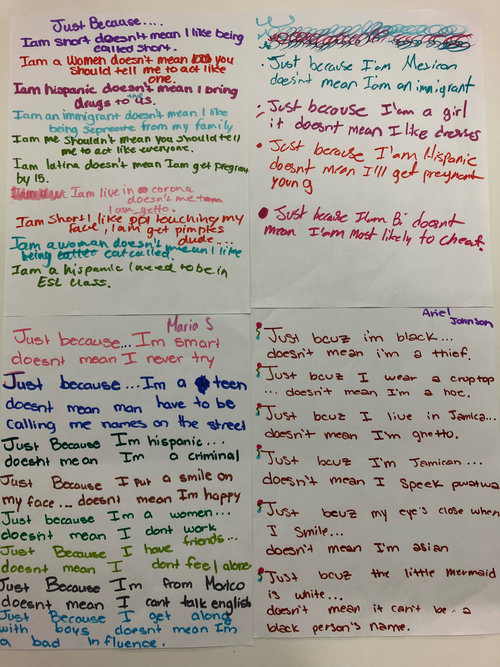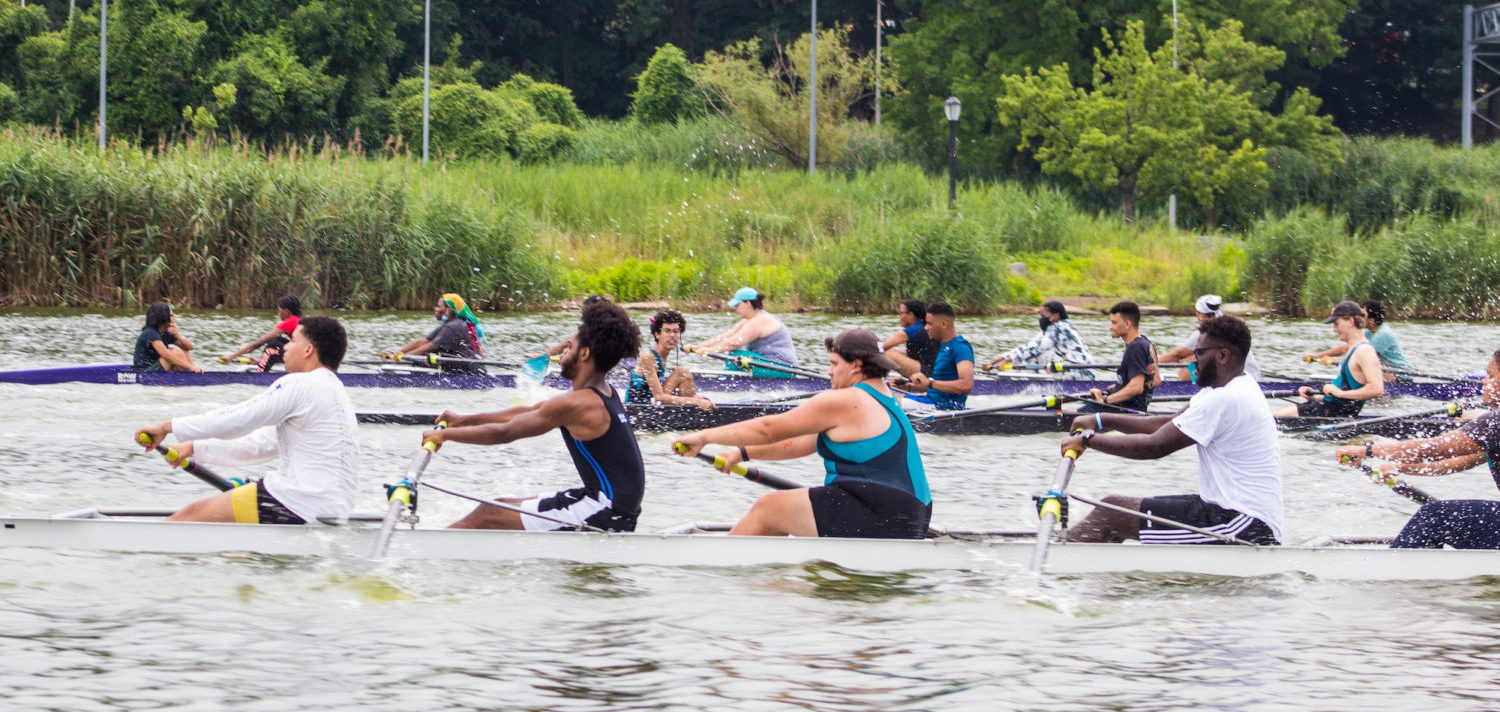Originally published by Future Leaders in Action
Written by Alessandra Tantawi, Future Leaders in Action Fellow at Row New York
I walk into Row New York’s Queens boathouse to facilitate my weekly Girl’s Empowerment workshop on a hot July afternoon dripping sweat. I see fifteen middle school students flopped on the floor in front of a large fan on top of yoga mats, “Alright, 5 minutes until group!” I shout out. I put out the materials for the day’s workshop and ask the girls to join me and form a circle. I look around to the bright faces of girls of color and explain, “Today we are going to talking about stereotypes, how they affect us and ways to dismantle them. We are going to do this by creating “Just Because” poems.” I read mine aloud as an example and one girl says, “Wow, that was powerful.” “Tell me what was powerful about it?” I ask. “I guess it’s just cool to like hear you like own you, you know?” “Absolutely, I do know. Your turn now.”

The girls went off to work on their poems and I walked around observing. I always try to remind myself to never be shocked by the power and intellect adolescents exude when given the chance to reflect upon their identities. Yet, I couldn’t help it; I was floored. These young women range in age from eleven to thirteen – their level of introspection was extraordinary. Throughout my career, I have vigorously challenged the construct that children must be a certain age to explore challenging and angst-producing topics such as politics and power structures. However, it is clear now more than ever that humans are never too young to reflect on who they are in relation to the world.
Carol Hanisch discussed in her 1969 essay, “The Personal is Political,” that everything a person does is inherently political and rooted within the political context of the time. The choices we make, and the acts we engage in, are reflective of the greater culture at large. It is imperative that young people, especially young girls of color, are granted the opportunity to see themselves as contributing members of society.
It is critical to for young girls of color to appreciate the fact that their lives matter, their ideas have meaning and their perspectives are valuable.
“Do we have to stand up when we read our poems?” asked one student. I smiled, and before I had the chance to respond, another student says, “Yea, she gonna make us do that.” We laughed, but I ask them, “Why do you think I want you to stand in front of us all, with strong posture and a clear, loud voice?” “So, you know, we can build confidence and like feel good.” says an 11-year-old. “Yes, we do this, to stand tall and proud as we announce our identities.” I asked “Who wants to go first?” At least five hands go up.
“Amazing, I love the bravery and strength I am seeing today. Let’s do this.”
The prompt simply was to state an identifying factor such as “Just because I am a girl” with an opposition to the stereotype that may be associated, “does not mean I am weak.” I did not set a numerical limit or expectation of the number they could present. The first girl is twelve years old – she stood up, set her posture tall, and read aloud with powerful elocution:
“Just because I am short does not mean I like being called short.
Just because I am a woman doesn’t mean you should tell me to act like one.
Just because I am Hispanic doesn’t mean I bring drugs to the US.
Just because I am an immigrant doesn’t mean I like being separated from my family.
Just because I am latina doesn’t mean I will get pregnant by 15.
Just because I live in Corona does not mean I am ghetto.
Just because I am Hispanic does not mean I need to be in an ESL class.
Just because I am a woman does not mean I deserved to be catcalled at.”
The majority of the girls at the Row New York summer camp in the Queens location are from the immediate community of Flushing and Corona. Almost all of the participants are of Latinx decent and it was clear this is the foundation of their identities. What makes this most apparent is that almost all girls wrote, “just because I am Hispanic does not mean I am a criminal” and “just because I am Mexican, does not mean I’m an immigrant, drug dealer or taco lover.”
These young girls are consciously debunking the negative and destructive stereotypes often foisted on them by society.
After everyone reads their poems, I asked them to use one word to describe how they felt in the moment. While some said “powerful,” and “strong,” a few, and one, in particular, expressed their disappointment and sadness as to how they are perceived. A thirteen-year-old girl said, “I am discouraged because I know society won’t change.” I tell them that we all feel this way at times and it’s okay but I ask her, “Do you know the history of girl groups?” “No” she answers. I explain, “When women and girls come together in a circle to discuss their experiences and identities and work to challenge stereotypes placed on them by society, not only is it powerful but it is a radical and political act of resistance.” I continue,
“Our fore-sisters before us understood the power and change that comes when women come together. Sharing our stories and participating in sister circles is where change happens. We take what we learn here, we listen to one another and realize we are not alone and, together, we rise.”
Future Leaders in Action is providing me the opportunity to further develop my group facilitation and curriculum development skills. It is an honor to work with the courageous and strong girls of Row New York.



